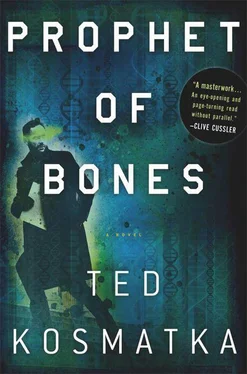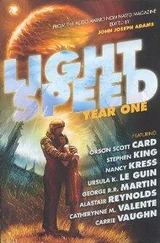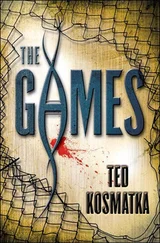It wasn’t just the disciplines—bones and genes—that were stratified at Westing. There were differences, too, within the gene freaks. A stratified hierarchy, with the assayers firmly at the top, information trickling down.
Paul got to know some of the other techs. He learned their stories.
Each tech’s area of expertise was compartmentalized; each understood his or her given data sets. There was little cross-training. The different labs required different badges, and the person who prepped was never the person who tested.
The samples all came to Westing through the third floor—carried in the bones themselves, or in lozenges sampled from the dig sites. After that, the samples were typed and turned into data—and then relabeled, repackaged, and sent to the assayers, whose job it was to interpret the data and send the information upstairs.
Paul’s own badge got him through the door of the testing lab, but the deeper assaying labs were still off-limits.
The way the system was designed, the typers knew the sample origin but couldn’t translate the raw code into meaningful information. The assayers divined meaning from the nucleotide base-pair sequences but knew nothing of the origin of the samples, or from which bones they’d derived.
Of all the recent techs, only Charles had access to the master bank of data sets. He alone could cross-reference. But it turned out that even his access wasn’t complete.
Only the fifth floor knew all the secrets.
Fifth-floor heaven, looking down.
The first time Paul had encountered Charles, he’d been confused by the man. It was Paul’s first week at Westing, and a stranger walked into the break room. The man tried to strike up a conversation about bird-watching. Paul told him politely that he wasn’t really into birds, but the man was undeterred. So began a half-hour soliloquy on the avian visual system.
Paul would learn over the course of the next few days that Charles could talk endlessly about two subjects: birds and quantitative reverse polymerase chain reaction assays.
Charles had worked in the gene frequency lab. He was tall and thin and pale. It was difficult to guess his age. He was balding, with wisps of curly, sandy-colored hair going gray at the top, but his face was smooth and young. He might have been thirty or forty-five. He tended to bounce when he walked—and he was always walking. Even when he spoke to you, he was walking, pacing back and forth, continually on the move.
Charles could do the autism trick; he’d show you if you asked.
It was almost diagnostic.
If you told him the date of your birth, he could tell you what day of the week you were born. He could do it instantly. When Paul learned this, his surprise shifted. He’d heard of people like this, of course. Many of them were in institutions.
Paul went from being surprised that Charles was so strange to being surprised that he was so normal. There were terms for what he was, after all. The fact that Charles could drive and hold a job meant that most of those terms would have the qualifier “high-functioning” in front of them.
Hongbin had his own term for him, though: “association savant.” Charles worked in multiple variant analysis.
Among the gene freaks of the fourth floor, he was the chosen one.
* * *
“Can I help you?”
The secretary’s name was Bratton. She was a formidable middle-aged woman partial to sweaters, black-rimmed glasses, and small mouse figurines. The figurines were glass mostly, of a cute anthropomorphic variety that seemed more than a little out of place in a research lab. She positioned them conspicuously around her workstation, as if to counteract the no-nonsense matter-of-factness that she exuded from every pore of her body. When Paul met her, she did not strike him as the kind of woman who would have a deep and abiding love for small glass mouse figurines. She was one of the two secretaries on the fourth floor and handled the various secretarial needs of the gene freaks. She did not get coffee.
“I’m running behind,” Paul said. “I was hoping you could help me with something.”
“If I can.”
“I sent Charles some rush samples a few months back, and I need the results yesterday.”
She stared at him over the tops of her glasses as if swatting away requests like this was a part of her job description that she particularly enjoyed. “You’re the new tech transferred from the third floor, right?”
“Yeah.”
“Well, I’m sorry to be the one who has to inform you of this, but Charles is on leave.”
“Leave?” Paul said, hoping his surprise sounded genuine.
“Yes.”
“I had no idea.”
“Yes.”
“Nothing serious, I hope.”
“Let’s hope not.”
“Any idea when he’ll return?”
“I haven’t been informed of a return date.”
“Well, these samples were a rush, and I still really need the results.”
“Other teams are taking over Charles’s workload. I’m surprised you hadn’t heard. There shouldn’t be much of a delay.”
Paul did his best to scowl. “I’m already past deadline on these samples.”
“What is the project number, and I’ll get—”
He cut her off: “It’s okay. I’m sure they’ll get done. You wouldn’t know what project Charles was working on just before he left?”
“I really wouldn’t have any idea.”
“Okay, thanks.” He turned to leave, then stopped. “I don’t mean to pry, but you wouldn’t happen to know the circumstances of his departure?”
“I’m really not privy to that kind of information.”
“I understand. But what I’m really asking is, do you think he’s coming back?”
The secretary shrugged. “I couldn’t say.”
Which, of course, could be interpreted in one of two ways.
Paul studied her closely, pushing one last time. “I mean, he’s not gone for good, is he?”
Ms. Bratton gave him a quizzical look, as if she were trying to decide how to answer—or perhaps how to tell him to mind his own business. “He’s still technically an employee, if that’s what you’re asking. He’s just on indefinite leave.”
“Thank you.”
* * *
Paul waited until after five o’clock, when the halls started to empty, and then slipped down the hall to Charles’s office. After glancing around to make sure he wasn’t being observed, he opened the door and stepped inside. The door closed silently behind him.
That was the thing about having badged checkpoints for each department. Once you were on the other side of security, it meant the offices didn’t need locks.
Charles’s office was the same size and shape as his own, a rectangular cell half as wide as it was deep. However, it had a window that received the afternoon sunlight, which now poured in through half-lidded blinds to bake a corrugated pattern across the white tile floor. Although nearly an architectural clone of Paul’s own office, it was as different from his as two rooms could be.
A large steel desk faced the door. Behind it was a row of short, gray filing cabinets. Bookshelves lined the opposite wall, and in them were not books but endless rows of binders. There were no posters on the walls. No paperweights on the desk. The little pieces of personality that tended to salt people’s work spaces were missing here. The computer, too, was different—a different creature entirely from the one that sat on Paul’s desk. This was a machine meant for serious code crunching. Three flat-screen computer monitors of various sizes were arrayed around the broad desktop.
One whole wall of Charles’s office was whiteboard. Nearly floor to ceiling. A small stool sat beneath it to allow Charles to reach any unscribbled corner of the white expanse. Currently the whiteboard was thoroughly graphitized with a massive accumulation of arcane chemical formulas and long strings of nucleotide base-pair sequences; lines connected different sequences. Paul realized why there were no bits of personality in the office. This, the whiteboard, was where Charles lived. It was the ultimate expression of his personality.
Читать дальше












